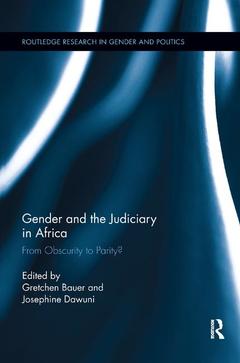Gender and the Judiciary in Africa From Obscurity to Parity? Routledge Research in Gender and Politics Series
Coordonnateurs : Bauer Gretchen, Dawuni Josephine

Between 2000 and 2015, women ascended to the top of judiciaries across Africa, most notably as chief justices of supreme courts in common law countries like Ghana, Nigeria, Sierra Leone, Gambia, Malawi, Lesotho and Zambia, but also as presidents of constitutional courts in civil law countries such as Benin, Burundi, Gabon, Niger and Senegal. Most of these appointments was a "first" in terms of the gender of the chief justice. At the same time, women are being appointed in record numbers as magistrates, judges and justices across the continent. While women?s increasing numbers and roles in African executives and legislatures have been addressed in a burgeoning scholarly literature, very little work has focused on women in judiciaries. This book addresses the important issue of the increasing numbers and varied roles of women judges and justices, as judiciaries evolve across the continent.
Scholars of law, gender politics and African politics provide overviews of recent developments in gender and the judiciary in nine African countries that represent north, east, southern and west Africa as well as a range of colonial experiences, postcolonial trajectories and legal systems, including mixes of common, civil, customary, or sharia law. In the process, each chapter seeks to address the following questions:
- What has been the historical experience of the judicial system in a given country, from before colonialism until the present?
- What is the current court structure and where are the women judges, justices, magistrates and other women located?
- What are the selection or appointment processes for joining the bench and in what ways may these help or hinder women to gain access to the courts as judges and justices?
- Once they become judges, do women on the bench promote the rights of women through their judicial powers?
- What are the challenges and obstacles facing women judges and justices in Africa?
Timely and relevant in this era in which governmental accountability and transparency are essential to the consolidation of democracy in Africa and when women are accessing significant leadership positions across the continent, this book considers the substantive and symbolic representation of women?s interests by women judges and the wider implications of their presence for changing institutional norms and advancing the rule of law and human rights.
Foreword Judge Mabel Agyemang 1. Gender and the Judiciary in Africa-An Introduction Josephine Dawuni 2. Egypt: The Lingering Battle for Female Judgeship Mahmoud Hamad 3. Botswana: Delayed Indigenization and Feminization of the Judiciary Gretchen Bauer and Rachel Ellett 4. South Africa: a Transformative Constitution and a Representative Judiciary Cathi Albertyn and Elsje Bonthuys 5. Nigeria: Women Judges Enhancing the Judiciary Hauwa Ibrahim 6. Tunisia: A New Constitution and More Women Judges Salsabil Klibi 7. Tanzania: Women Judges as Agents of Judicial Education Mi Yung Yoon 8. Benin: Women Judges Promoting Women’s Rights Alice Kang 9. Ghana: the Paradox of Judicial Stagnation Josephine Dawuni 10. Rwanda: Balancing Gender Quotas and an Independent Judiciary Jean-Marie Kamatali 11. Gender and the Judiciary in Africa: Conclusion Gretchen Bauer
Gretchen Bauer is professor of political science and international relations at the University of Delaware, USA. Her current research focuses on women’s political leadership in sub-Saharan Africa. She is the co-editor with Manon Tremblay of Women in Executive Power: A Global Overview (2011) and with Hannah Britton of Women in African Parliaments (2006).
Josephine Dawuni is an assistant professor of political science at Howard University. Her current research focuses on women and the judiciary in sub-Saharan Africa.
Date de parution : 08-2018
15.2x22.9 cm
Date de parution : 11-2015
15.2x22.9 cm
Thème de Gender and the Judiciary in Africa :
Mots-clés :
Gender; Judicial Politics; Africa; Democratic Development; Women Judges; Women & Politics; Emang Basadi; Colonial Administration; Circuit Courts; Female Judges; JSC; Gender Based Violence Cases; Gender Representativity; United Nations Democracy Fund; Civil Law Legal Systems; Roman Dutch Law; Customary Court; Military Junta; Kadhi’s Courts; African Women Judges; Primary Courts; President Kikwete; Female Chief Justice; Civil Society; Common Law Countries; Resident Magistrate Courts; Tanzania Mainland; Nigerian Judiciary; South African Common Law; President Khama



